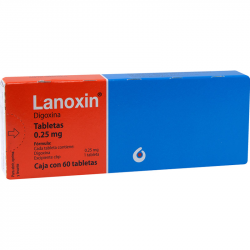Lanoxin (digoxin) Coupons, Discounts & Cost
Lanoxin is a cardiotonic drug. One way to save money on the Lanoxin retail cost regardless of income and insurance status is to use Lanoxin coupons or discount cards from RXCoupons. Use our Digoxin coupons at your online pharmacy and receive up to 75% off the sale price each time you refill your prescription.
Lanoxin indications
Lanoxin is a cardiotonic drug. It has a pronounced effect on both systole and diastole phase. It is able to slow heart rate and has a diuretic action.
Digoxin tablets are used in the treatment of chronic heart failure and chronic atrial flutter (particularly with chronic heart failure).
Digoxin injectable solution is used in the treatment of chronic heart failure in atherosclerotic cardiosclerosis, valvular heart disease, paroxysmal supraventricular arrhythmias (atrial flutter, atrial fibrillation, supraventricular tachycardia).
Lanoxin contraindications
There are several contraindications for Lanoxin therapy: cardiac glycoside intoxication, Wolff-Parkinson-White syndrome, atrioventricular block (II degree), complete heart block, hypersensitivity to the drug. Moreover, Lanoxin should not be used during the period of breastfeeding.
Use with caution in the following cases: atrioventricular block (I degree), acute myocardial infarction, arrhythmia, unstable angina, cardiac tamponade, isolated mitral stenosis, renal or hepatic insufficiency, elderly patients, patients up to 3 years.
Lanoxin tablets should be used with caution in patients with sick sinus syndrome, heart failure with abnormal diastolic function (restrictive cardiomyopathy, constrictive pericarditis, cardiac amyloidosis), hypertrophic obstructive cardiomyopathy, cardiac asthma, hypoxia, pulmonary heart disease, alkalosis, hypothyroidism, myocarditis, obesity, as well as hypokalemia, hypomagnesemia, hypercalcemia, hypernatremia.
Digoxin is used during pregnancy only if the clinical benefit to the mother outweighs the potential harm to the fetus.
How to take Lanoxin
The dose is set individually. Patients who took other cardiac glycosides should reduce the dose of digoxin. The recommended dosage for patients older than 10 years: 0.75-1.25 mg 2 times a day. As a rule, Lanoxin is used in long-term treatment. The daily dose for patients with chronic heart failure should not exceed 0.25-0.375 mg. Elderly patients should take in a dose of 0.0625-0.125 mg.
Treatment of children 3-10 years: 0.05-0.08 mg per kg per day.
The recommended dosage for digoxin solution: intravenous injections, 0.25 mg 3 times a day. Maintenance therapy: up to 0.5 mg per day (1-2 doses). Paroxysmal supraventricular arrhythmia: daily dose - 0.25-1 mg. Dose for children: 0.05-0.08 mg per kg of body weight per day. Maintenance dose for children: 0.01-0.025 mg per kg of weight per day.
Lanoxin side effects
Side effects may occur due to an overdose:
Cardiovascular system: ventricular premature beats, ventricular arrythmia, ventricular paroxysmal tachycardia, sinus bradycardia, junctional tachycardia, AV block, atrial flutter and atrial fibrillation.
Nervous system: headache, sleep disturbances, dizziness, neuritis, paresthesia, manic-depressive syndrome, syncope; rarely - disorientation, confusion, visual hallucinations (mainly in atherosclerosis in the elderly).
Digestive system: abdominal pain, nausea, vomiting, anorexia, diarrhea, bowel necrosis.
Allergic reactions: skin rash; rarely - urticaria.
Other systems: blurred vision, nasal bleeding, thrombocytopenic purpura, petechiae, gynecomastia, hypokalemia.
Digoxin solution:
Cardiovascular system: AV-block, bradycardia, heart rhythm disorders; rarely - mesenteric artery thrombosis.
Nervous system: fatigue, headache, dizziness; rarely - decreased visual acuity, xanthopsia, sleep disturbances, depression, syncope, confusion, euphoria.
Digestive system: nausea, vomiting, anorexia, diarrhea.
Endocrine system: gynecomastia (during long-term therapy).
Precautions
Digoxin should be used under medical supervision. It is necessary to reduce the dose in elderly patients and those with chronic pulmonary heart, coronary insufficiency, disturbance of water and electrolyte balance, renal or hepatic insufficiency. Patients with impaired renal function should reduce the dose of digoxin.
Use caution in AV block (degree I). The risk of glycoside intoxication increases with hypomagnesemia, hypokalemia, hypercalcemia, hypothyroidism, hypernatremia, pulmonary heart, myocarditis.
Patients should not change the doses of the drug. Take Lanoxin every day at the same time. Seek immediate medical attention if your heart rate is less than 60 beats per minute. If you forget a dose, take it as soon as you remember. Patients should inform the doctor if they want to discontinue therapy. It is necessary to seek medical advice in case of nausea, vomiting, diarrhea.

